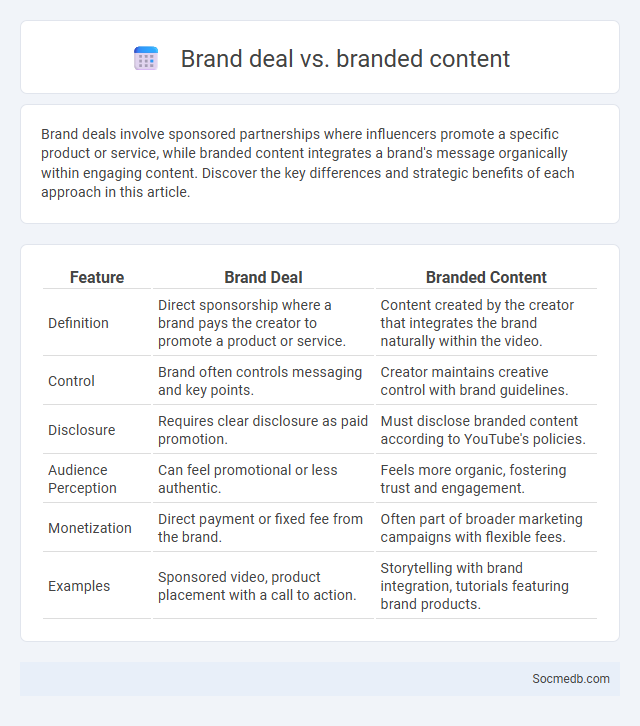
Photo illustration: Brand deal vs Branded content
Brand deals involve sponsored partnerships where influencers promote a specific product or service, while branded content integrates a brand's message organically within engaging content. Discover the key differences and strategic benefits of each approach in this article.
Table of Comparison
| Feature | Brand Deal | Branded Content |
|---|---|---|
| Definition | Direct sponsorship where a brand pays the creator to promote a product or service. | Content created by the creator that integrates the brand naturally within the video. |
| Control | Brand often controls messaging and key points. | Creator maintains creative control with brand guidelines. |
| Disclosure | Requires clear disclosure as paid promotion. | Must disclose branded content according to YouTube's policies. |
| Audience Perception | Can feel promotional or less authentic. | Feels more organic, fostering trust and engagement. |
| Monetization | Direct payment or fixed fee from the brand. | Often part of broader marketing campaigns with flexible fees. |
| Examples | Sponsored video, product placement with a call to action. | Storytelling with brand integration, tutorials featuring brand products. |
Understanding Brand Deals: Definition and Key Features
Brand deals on social media involve collaborations between influencers or content creators and companies aiming to promote products or services authentically to targeted audiences. Key features include clearly defined deliverables, compensation agreements, and adherence to platform guidelines and disclosure regulations to maintain transparency. Understanding these elements helps creators maximize partnership benefits while enhancing brand visibility and credibility.
What is Branded Content? Core Characteristics Explained
Branded content is a marketing strategy that blends advertising with storytelling to create engaging, relevant material reflecting a brand's values and identity. It emphasizes authenticity, emotional connection, and subtle promotion rather than overt selling, making your audience more receptive to the message. Core characteristics include seamless integration with the platform, value-driven content, and alignment with the target audience's interests and lifestyle.
Brand Deals vs Branded Content: Main Differences
Brand deals involve direct partnerships where influencers promote a product or service for payment, often with clear contractual terms and exclusive rights. Branded content integrates a brand's message organically into the creator's content, focusing on authenticity and long-term audience engagement without overt promotion. The main difference lies in the approach: brand deals emphasize transactional promotion, while branded content prioritizes subtle storytelling aligned with brand identity.
Benefits of Brand Deals for Creators and Brands
Brand deals offer creators significant revenue streams and increased visibility by partnering with established brands, enhancing their credibility and audience reach. Brands benefit from authentic content that targets niche markets, driving higher engagement and conversion rates. These collaborations foster long-term relationships, boosting both brand loyalty and creator influence in competitive digital landscapes.
Advantages of Branded Content Strategies
Branded content strategies enhance audience engagement by creating authentic and relatable storytelling that fosters trust and loyalty. These strategies drive higher conversion rates through targeted content that resonates with specific customer segments, increasing brand visibility and retention. Leveraging platforms like Instagram, YouTube, and TikTok maximizes reach while offering measurable analytics for optimizing future campaigns.
Audience Perception: Brand Deal vs Branded Content
Audience perception often distinguishes brand deals as paid endorsements with clear promotional intent, while branded content integrates marketing messages more subtly within engaging narratives. Studies show consumers tend to trust branded content more due to its authentic storytelling and value-driven approach, leading to higher engagement rates and brand recall. Platforms like Instagram and YouTube report that branded content generates up to 30% higher viewer retention compared to straightforward brand deals.
Legal and Disclosure Considerations
Social media platforms require strict adherence to legal and disclosure regulations including compliance with the Federal Trade Commission (FTC) guidelines for transparency in advertising and influencer partnerships. Users and brands must clearly disclose sponsored content and endorsements to avoid deceptive practices and potential legal penalties. Intellectual property rights and privacy laws also necessitate careful content sharing and user data handling to prevent violations and lawsuits.
Measuring ROI: Brand Deals vs Branded Content
Measuring ROI on social media requires analyzing engagement metrics, conversion rates, and customer lifetime value from both brand deals and branded content. Brand deals often deliver immediate visibility and direct sales impact through influencer promotions, while branded content fosters long-term brand loyalty and organic reach. Understanding your audience's response to each type allows you to optimize your social media strategy for maximum return on investment.
Choosing the Right Approach for Your Marketing Goals
Selecting the right social media strategy depends on your specific marketing objectives, whether brand awareness, lead generation, or customer engagement. Platforms like Instagram excel in visual storytelling for brand building, while LinkedIn is optimal for B2B lead generation and professional networking. Tailoring content types and ad formats to fit these goals enhances ROI and aligns campaign efforts with measurable results.
Future Trends: The Evolution of Brand Collaborations
Future trends in social media reveal a significant evolution in brand collaborations, emphasizing immersive experiences through augmented reality and AI-driven personalization. Influencer partnerships will increasingly leverage data analytics to target niche audiences with tailored content, maximizing engagement and conversion rates. Your ability to adapt to these technological advancements will be crucial for maintaining a competitive edge in the digital marketing landscape.
 socmedb.com
socmedb.com